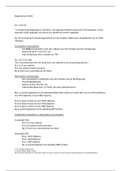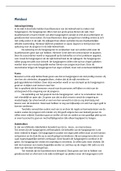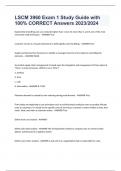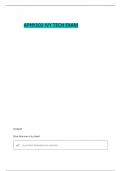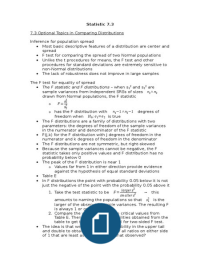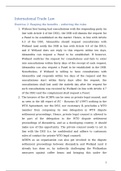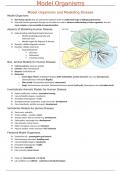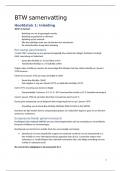International Trade Law
Readings 3: MFN-Treatment and National-Treatment Obligation
Van den Bossche & Zdouc, The Law and Policy of the World Trade
Organisation
Chapter 4: Most-Favoured Nation Treatment
Introduction
MFN-treatment = whether a country favours some countries over
others Article I:1 of the GATT 1994 and Article II:1 of the GATS
Most-Favoured-Nation Treatment under the GATT 1994
One of the very pervasive obligations in the WTO system
Nature of the MFN Treatment Obligation of Article I:1 of the GATT 1994
Article I:1 prohibits discrimination between like products
originating in, or destined for, diferent countries and it is to ensure
the equality of opportunity to import from or export to other WTO
Members
Applies not only de jure, but also de facto usually violation of de
facto-obligation
MFN Treatment Test of Article I:1 of the GATT 1994
Four-step test:
1. Whether the measure at issue is a measure covered by Article
I:1;
2. Whether the measure grants an ‘advantage’;
3. Whether the products concerned are ‘like products’; and
4. Whether the advantage at issue is accorded ‘immediately and
unconditionally’ to all like products concerned, irrespective of
their origin or destination.
Complainant does not have to show actual trade efects nor the
discriminatory intent of the measure at issue!
Measures covered by Article I:1
Article I:1 covers: Customs duties, charges of any kind imposed on
or in connection with importation or exportation, charges imposed
on the international transfer of payments for imports or exports, the
1
, method of levying such duties and charges, such as the method of
assessing the base value on which the duty or charge is levied, all
rules and formalities in connection with importation and
exportation, internal taxes or other internal charges, and laws,
regulations and requirements afecting internal sale, ofering for
sale, purchase, transportation, distribution or use of any product
broad range of measures!
Argentina – Financial Services, panel: in connection with
exportation shall mean a direct link or logical relationship between
the measure and the exports
Scope of Article I:1 is not unlimited, however, measures covered by
Articles III:2 and III:4, fall within the ambit of Article I:1 but not
those covered by Article III:8(b) (EC Conmercial Vessels, panel)
measures relating to subsidies to domestic producers, and by
analogy also matters of government procurement (Article III:8(a))
Measure Granting an ‘Advantage’
Any advantage more favourable competitive opportunities (EC –
Bananas III, panel & AB) link factual situation to whether there is
an advantage!
Any advantage for any like product (Canada – Autos, AB, US – Tuna
II & US – Tuna II (Mexico) (Article 21.5))
No balancing possible! (US – MFN Footwear, panel)
‘Like Products’
Criteria coming from the panel in Spain – Unroasted Cofee:
physical characteristics, end use and tarif regimes of other
Members
Generally, WTO panels would also now consider consumers’ tastes
and habits (perception of usability and substitutability)
Normally, production methods will not infuence the likeness of a
product (only if they impact the consumer’s buying behaviour!)
Advantage Accorded ‘Immediately and Unconditionally’
No immediate advantage? Measure will fail automatically if
advantage proven under step 2
2
, Unconditional? Other Members should not have to fulfl the same
conditions as the other party to receive the advantage
Most-Favoured-Nation Treatment Obligation and the Enabling Clause of
the GATT 1994
Preferential Tarif Treatment for Developing Countries under the
Enabling Clause
Paragraph 2(a) preferential treatment from developed countries
to developing countries in accordance with the Generalised System
of Preferences
Operates as an exception to Article I:1, and Members are
encouraged to do so
Requirements for the deviation are in Paragraphs 3 and 4 of the
Ministerial Decision shall not raise barriers, not an impediment
to the reduction or elimination of tarifs and other restrictions to
trade and shall be designed to respond positively to the
development, fnancial and trade needs of developing countries
Additional Preferential Tarif Treatment under the Enabling Clause
EC – Tarif Preferences , panel preferential treatment shall be
given to developing countries and shall be non-discriminatory
EC – Tarif Preferences , AB preferential treatment is non-
discriminatory for those countries which have the same
development, fnancial and trade needs to which the treatment in
question is intended to respond ‘similarly situated’ countries
Most-Favoured Nation Treatment under the GATS
Nature of the MFN Treatment Obligation of Article II:1 of the GATS
Prohibition of discrimination between like services and service
suppliers from diferent countries
Applies to both de jure and de facto discrimination (EC – Bananas
III, AB)
MFN Treatment Test of Article II:1 of the GATS
Three-step test:
1. Whether the measure at issue falls within the scope of
application of Article II:1 of the GATS;
3
Readings 3: MFN-Treatment and National-Treatment Obligation
Van den Bossche & Zdouc, The Law and Policy of the World Trade
Organisation
Chapter 4: Most-Favoured Nation Treatment
Introduction
MFN-treatment = whether a country favours some countries over
others Article I:1 of the GATT 1994 and Article II:1 of the GATS
Most-Favoured-Nation Treatment under the GATT 1994
One of the very pervasive obligations in the WTO system
Nature of the MFN Treatment Obligation of Article I:1 of the GATT 1994
Article I:1 prohibits discrimination between like products
originating in, or destined for, diferent countries and it is to ensure
the equality of opportunity to import from or export to other WTO
Members
Applies not only de jure, but also de facto usually violation of de
facto-obligation
MFN Treatment Test of Article I:1 of the GATT 1994
Four-step test:
1. Whether the measure at issue is a measure covered by Article
I:1;
2. Whether the measure grants an ‘advantage’;
3. Whether the products concerned are ‘like products’; and
4. Whether the advantage at issue is accorded ‘immediately and
unconditionally’ to all like products concerned, irrespective of
their origin or destination.
Complainant does not have to show actual trade efects nor the
discriminatory intent of the measure at issue!
Measures covered by Article I:1
Article I:1 covers: Customs duties, charges of any kind imposed on
or in connection with importation or exportation, charges imposed
on the international transfer of payments for imports or exports, the
1
, method of levying such duties and charges, such as the method of
assessing the base value on which the duty or charge is levied, all
rules and formalities in connection with importation and
exportation, internal taxes or other internal charges, and laws,
regulations and requirements afecting internal sale, ofering for
sale, purchase, transportation, distribution or use of any product
broad range of measures!
Argentina – Financial Services, panel: in connection with
exportation shall mean a direct link or logical relationship between
the measure and the exports
Scope of Article I:1 is not unlimited, however, measures covered by
Articles III:2 and III:4, fall within the ambit of Article I:1 but not
those covered by Article III:8(b) (EC Conmercial Vessels, panel)
measures relating to subsidies to domestic producers, and by
analogy also matters of government procurement (Article III:8(a))
Measure Granting an ‘Advantage’
Any advantage more favourable competitive opportunities (EC –
Bananas III, panel & AB) link factual situation to whether there is
an advantage!
Any advantage for any like product (Canada – Autos, AB, US – Tuna
II & US – Tuna II (Mexico) (Article 21.5))
No balancing possible! (US – MFN Footwear, panel)
‘Like Products’
Criteria coming from the panel in Spain – Unroasted Cofee:
physical characteristics, end use and tarif regimes of other
Members
Generally, WTO panels would also now consider consumers’ tastes
and habits (perception of usability and substitutability)
Normally, production methods will not infuence the likeness of a
product (only if they impact the consumer’s buying behaviour!)
Advantage Accorded ‘Immediately and Unconditionally’
No immediate advantage? Measure will fail automatically if
advantage proven under step 2
2
, Unconditional? Other Members should not have to fulfl the same
conditions as the other party to receive the advantage
Most-Favoured-Nation Treatment Obligation and the Enabling Clause of
the GATT 1994
Preferential Tarif Treatment for Developing Countries under the
Enabling Clause
Paragraph 2(a) preferential treatment from developed countries
to developing countries in accordance with the Generalised System
of Preferences
Operates as an exception to Article I:1, and Members are
encouraged to do so
Requirements for the deviation are in Paragraphs 3 and 4 of the
Ministerial Decision shall not raise barriers, not an impediment
to the reduction or elimination of tarifs and other restrictions to
trade and shall be designed to respond positively to the
development, fnancial and trade needs of developing countries
Additional Preferential Tarif Treatment under the Enabling Clause
EC – Tarif Preferences , panel preferential treatment shall be
given to developing countries and shall be non-discriminatory
EC – Tarif Preferences , AB preferential treatment is non-
discriminatory for those countries which have the same
development, fnancial and trade needs to which the treatment in
question is intended to respond ‘similarly situated’ countries
Most-Favoured Nation Treatment under the GATS
Nature of the MFN Treatment Obligation of Article II:1 of the GATS
Prohibition of discrimination between like services and service
suppliers from diferent countries
Applies to both de jure and de facto discrimination (EC – Bananas
III, AB)
MFN Treatment Test of Article II:1 of the GATS
Three-step test:
1. Whether the measure at issue falls within the scope of
application of Article II:1 of the GATS;
3


